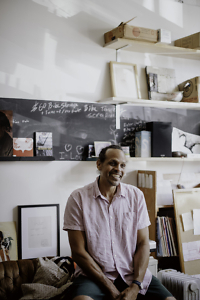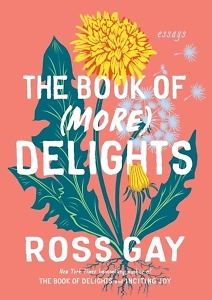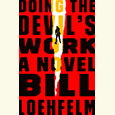Looking at Everything
Ross Gay reprises his practice of everyday delight
“Share what delights us; share what we love.” These lines from the introduction of Ross Gay’s latest book, The Book of (More) Delights, act as an invocation for readers to believe in each other and to act on such belief for the good of the world.

In 2016, when he turned 40, Gay set a simple practice to write daily for a full year about something that delighted him. These “essayettes” as he called them were to be written fast and by hand. The world would experience great tumult that year, and as a Black man living in America, Gay never forsook the fray for the frivolous as he journaled to find joy every single godforsaken day. When he finished, his meditations became The Book of Delights, a New York Times bestseller, and the act of creating them became a “useful, fun, and unpredictable lifelong project.”
This new volume, written five years later over the course of one year, again starting and ending on his birthday, spans a world that has changed but not changed enough. Gay admits to revisiting many familiar characters and themes: his garden, his partner, his friends, his mother, and of course, surprising encounters with strangers. Gay warns readers that some questions he holds never resolve, including his considerations around public space and his questioning of authority. He again deconstructs the way power is used — whether in academia and national politics or by an uptight volunteer with a self-made badge. No encounter is too common, no issue too complex for Gay when he sets out to shed his unique and luminous light on it.
“For the record, I do not think of this as looking on the bright side, I think of it as looking at everything,” writes Gay in “Eat Candy! Destroy the State!” — a title that encapsulates his ability to hold both the whimsical and the subversive. In another essay on the power plays of self-appointed authorities versus the surprising kindness of strangers, he quips, “There is a reason an alternative title for this book is The Book of Despites.”
 And yet Gay’s delight this time is tinged with age not rage. He tarries even more over the quotidian, noticing the fleeting nature of all that captures his gaze, from blue-spectacled tulips to a crop of sweet potatoes to dreams about dancing or visits from his late father. On the anniversary of his father’s death, Gay notices his dad’s slippers, which like some benevolent Horcrux extend this grace to him: “I appreciate your concern, I truly do, but please remember my death was not the most important part of my life. Or, I hope, yours.” The title of an essay on the local bookstore that did not reopen after the pandemic is more manifesto than in memoriam: “Friends Let Us Do Our Best Not to Leave This Life Having Not Loved What We Love Enough.”
And yet Gay’s delight this time is tinged with age not rage. He tarries even more over the quotidian, noticing the fleeting nature of all that captures his gaze, from blue-spectacled tulips to a crop of sweet potatoes to dreams about dancing or visits from his late father. On the anniversary of his father’s death, Gay notices his dad’s slippers, which like some benevolent Horcrux extend this grace to him: “I appreciate your concern, I truly do, but please remember my death was not the most important part of my life. Or, I hope, yours.” The title of an essay on the local bookstore that did not reopen after the pandemic is more manifesto than in memoriam: “Friends Let Us Do Our Best Not to Leave This Life Having Not Loved What We Love Enough.”
Practicing delight opens Gay up to the kind of grace that accompanies grief as well as a range of other emotions, softer ones than his younger self — the college athlete and rebellious son — could hold. On the basketball court he opposes youthful players and notices his own weakness as one of the “many jewels of aging.” When he falls on his ass after being aggressively fouled, he delights in the compassion he feels: “I felt myself feel nothing like rage or embarrassment or hurt or, god forbid, disrespect … I felt love for this little tough guy and I felt myself feeling love for this little tough guy and so much love I’m pretty sure it was also for my own little tough guy, getting less tough, and littler, by the day.”
Delight is found through attention but not merely to the present. Some of his most insightful passages come when a delight dislodges a memory. Gay’s memories of his youth are vibrant and full of funny, familiar details. In an essay dedicated to an old friend who gave him protest t-shirts and philosophy books, Gay, an avowed agnostic, recognizes the power of belief. “Though I never would have said this out loud …I have needed to be — we need to be — believed in.”
Belief in our compassion and care for one another is Gay’s answer to the dehumanizing forces that break us and our society apart. Gay makes this proposal early but subversively in the first and longest footnote of the book, when he reflects on all the ways capitalism thrives on our suspicion. Believing in “care, in sharing, in the everyday banal precious luminous potential and in-our-face goodness of each other” helps us to see what Gay has experienced since he wrote and published his first delights. As a result of that book, Gay became the recipient of other people’s delights via emails and letters and through the stories he heard on his book tours. “That we are so often the source of, the tether to, each other’s delight” is how delight becomes not just a temporary state but an enduring trait.

Beth Waltemath is a writer and a native Nashvillian. She currently lives in Atlanta, Georgia. Her essays have appeared in The New York Times, The Washington Post, and Chapter 16. She is a full-time journalist for the Presbyterian News Service.


